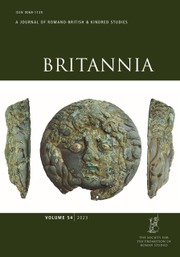Article contents
The Origin of Romano-British Glass Bangles: Forgotten Artefacts from the Late Pre-Roman Iron Age
In memory of Professor Jennifer Price
Published online by Cambridge University Press: 03 July 2020
Abstract
This article reviews the emergence and development of Romano-British glass bangles in southern Britain by providing a fresh analysis of finds that also considers recent theoretical and historical advances in interpreting the transition from the late Iron Age to the Roman period. By analysing the emergence of bangles in terms of technological and stylistic transfer, it suggests that the technology used in their production and their visual elements have continental lineage. It also situates bangles amid indigenous developments in bodily adornments in southern Britain before a.d. 43. By reconnecting British bangles with their continental European counterparts and contextualising them within political, social and cultural processes in south-western England during the late pre-Roman Iron Age, the article argues that the emergence of bangles in Britain did not occur in a vacuum after the Claudian invasion in a.d. 43 but formed an integral part of globalising networks of cross-Channel trade and connections with the European mainland in the early first century a.d.
Keywords
- Type
- Articles
- Information
- Copyright
- Copyright © The Author, 2020. Published by Cambridge University Press on behalf of The Society for the Promotion of Roman Studies
Footnotes
During the preparation of this paper, the sad news reached me that Professor Jennifer Price had passed away. Professor Price provided invaluable support to me during my two-year postdoctoral study of glass bangles and discussed the hypotheses expressed in this paper with me on various occasions. I have benefited greatly from her input and critical interventions. It was always a pleasure to visit her in York to discuss bangles and to share our enthusiasm for these artefacts.
References
BIBLIOGRAPHY
- 3
- Cited by


